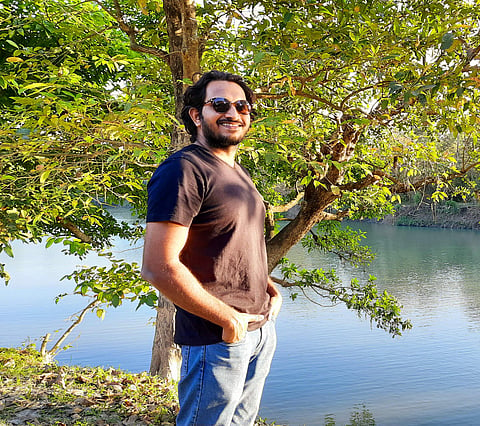

Madhu Raghavendra is a poet, curator, and social activist and the author of three books of poetry, Make Me Some Love To Eat, Stick No Bills and Being Non-essential. He is the founder of Poetry Couture, a movement that has created free spaces for poetry in many cities of India and in the North East. He uses performance poetry as a tool to advocate human and environmental rights. His work has been featured in many literary journals and his poems have been translated into many languages. He is currently a doctoral student of cultural studies at University of Tezpur, and plans to research contemporary performance poetry in India.
We speak to him about the journey in poetry. Excerpts:
When did Poetry Couture begin and how did the group spread across different cities?
Even before I started Poetry Couture, I worked with the Department of Women and Child Welfare, Government of India and my job had me on the field. I always travelled to different cities in India. Whenever I visited these cities, I would create different groups of people who loved poetry. That's how the Poetry Couture began way back in 2013. Besides getting together in public spaces to read poetry, we also inculcated the culture of slam poetry in the college fests. The whole idea of open mic began from here. It democratised the reading of poetry where you can express your thoughts about the social issues, identity crisis, mental health issues and so on.
Did Poetry Couture set an example for events like poetry reading and open mic?
Definitely. Way back in 2013 when there was slam poetry happening in Mumbai, Calcutta, Delhi and Chennai, there were other smaller poetry groups that joined us. The idea with which I started Poetry Couture was successful because I wanted the art or poetry to be free and not remain autocratic. Though I wanted to focus on my writing, I always wanted to create an environment where poetry was free, read and heard by everybody. I did not like poetry going back to the shelf. Even in school, the poetry was restricted to reading poems written by some poets but there are people around us who write poems and post them on social media. And the Poetry Couture platform gives space for them to read whatever they write.
You have started a nature poetry walk in Assam. When did it begin and how it works?
The poetry walk began in December 2020 in Assam, a place where I have been staying with my wife and child. I don't believe in sticking to one idea or thought forever. And the poetry walk was a new concept. Here, I take small groups of people on a walk through nature. While they enjoy the view, they will get to learn to write poems and journaling whatever they feel and think. We also read some beautiful poems written by famous poets around the world and remain in silence for some time.
Your book was also tweeted by Shashi Tharoor. How did that happen?
I was fortunate enough to meet Shashi Tharoor at a Literature Festival in January 2020 where we both had to address different sessions. I was holding my book Stick No Bills. This book is a collection of my poems. He took the picture of the book. I did not expect him to tweet about it but he was generous enough to tweet the photograph and mention my name. The book cover also has me carrying my baby which is quite unique. It shows that a father is equally attached to the child, much like a mother. In my case, my wife is a doctor, I am a homemaker and poet who also takes care of the child.
Here are two poems written by Madhu for his upcoming book, Being Non-essential
Artist
I don't mind
being the non-essential.
Even a child takes
its mother for granted.
It does not run back
to its mother until it's hurt.
Nobody first thinks of water
when they arrive
at an exquisite dinner party,
until they are choking.
I don't mind
being the non-essential
knowing you will come looking
when things are broken
and nothing else works.
Art is non-essential
Until it is not.
Why does art go hungry?
In the story of the ants
and the grasshopper
